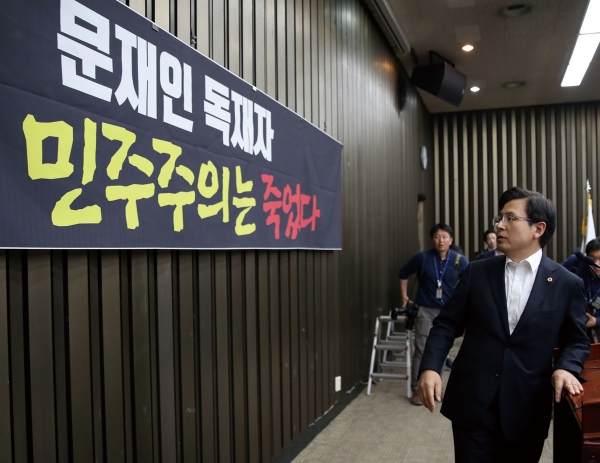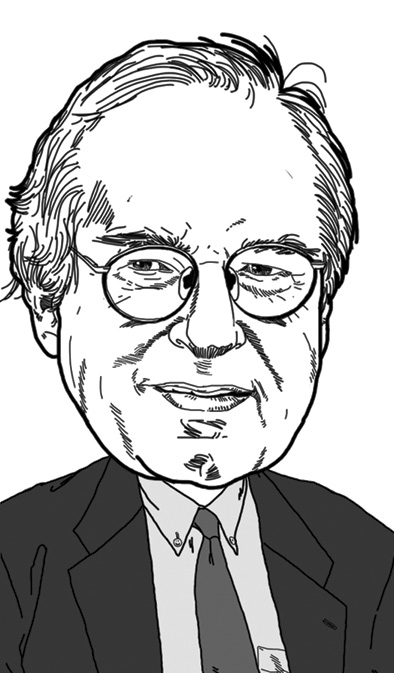부패수사의 특수책임을 맡은 공수처 설립 논쟁이 한국에서 좌·우 갈등을 심화시키며 민주주의제도를 시험하고 있다. 강도 높은 개혁 추진과 공약 실현 열망을 가진 문재인 대통령은 정권을 더 공고히 해야 할 필요성에 따라 자신의 권력을 확장하고 보수의 목소리와 논리를 제한하기를 확실히 원하고 있다.
대통령의 권한을 강화하려는 시도는 권위주의적 지도자들이 항상 그들의 위치를 강화하고 정적을 억압하려는 태도를 떠올리게 한다. 물론 문재인 대통령을 조셉 스탈린이나 중국의 마오쩌둥과 같은 독재자들과 비교하는 것은 과장일 수 있다. 하지만 정적들을 가두고, 비판에 재갈을 물리는, 그런 표현의 자유를 억압하는 제도는 분명히 우려스러운 것이다.
우리는 이미 방송 제작자와 출판사, 그리고 언론인에 대한 위협과 함께 방송 전반에 걸쳐 통제를 가하는 제도의 시작을 지켜 봐 왔다. 확실한 것은 이 정부가 자신의 정책에 대한 비판을 두려워한다는 것이며, 그러한 비판은 강제성을 띤 경제와 사회에 대한 개혁, 그리고 한국의 자유민주주의를 파괴하는 위험을 가질 뿐, 아무 성과도 없는 대북화해정책에 대한 것이다.
정적을 절멸시키기 위해 엘리트로 구성된 특수권력기구를 창설하는 것은 세계 역사에서 새로운 것이 아니다. 하지만 한국에서 그러한 것은 1987년 민주화 체제의 원칙과 5년마다 시행하는 대통령 선거제 원칙에 반하는 것이다. 이제 정부는 자신의 반대세력을 그렇게 밀어낼 수단으로 삼을 수 있는 또 다른 기구들을 제안하고 있다. 그러한 것은 어디에나 있는 독재의 전형적인 출발점이다. 국가 경찰기구와 정보기구들은 초법적인 성격을 띠면서 강력해질 것이다.
이미 그렇게 가공할 만한 조직들을 더 확대하려는 관점의 본질은 무엇인가? 그 대답은 아마도 모든 권위주의적 지도자가 그랬듯이 자신의 엘리트들로 하여금 다루기 쉽지 않은 조직의 논리를 초월해 자신의 의지를 관철 시키고, 지시하는 것을 정확하게 따르게 하려는 의도일 것이다.

특별사법기구 독재자들이 선호
문 대통령과 그의 조력자들, 그리고 자문역들은 그들의 내치와 외교 정책에 반대하는 이들을 억누르고자 각종 영장에 대한 범위를 확장할 필요를 느끼고 있다. 북한 김정은이 핵 프로그램을 처박아두면 둘수록 문재인 정부는 지난 남북정상회담의 요술에 대한 믿음에도 불구하고 얻어낼 것이 더 없어진다. 이러한 현실 속에서 문재인 대통령은 비핵화에 대한 회의를 잠재울 필요를 느낄 것이다. 그러나 아무리 비판을 억압할 초권력적인 기구라 하더라도 정권의 하락하는 지지율과 경제적 실패라는 정부의 무능은 감출 수 없다.
전형적인 권위주의 지도자들은 정적(政敵)의 비판을 틀어막기 위해 믿을 만한 강력한 공권력 수단에 의지하려 든다. 문 대통령의 모든 정치적 경력은 민주주의 원칙에 대한 자신의 고백적 믿음에 기초하고 있다. 그럼에도 불구하고 문 대통령이 사적인 정보기구로 전락할 수 있는 특수기구를 변호사들과 특정이념 숭배자들로 설립한다는 것은 지나치게 도를 넘어선 것이다.
문 대통령에게 권력 집중은 쉽지 않을 것이다. 한국의 보수세력은 정치적으로 갈려 있을 수 있다. 하지만 자신들의 권리에 대해서는 강력하다. 자유한국당은 의회에서 두 번 째 로 많은 의석을 차지하고 있다. 이 정당의 지지층은 사업가와 군인들, 그리고 보통의 사람들에 이른다.
한국의 전통적인 보수 이념은 튼튼한 경제적 성공과 함께 북한에 대한 안보, 그리고 지역과 사회의 통합을 표방한다. 문재인 대통령의 일부 자문역은 자신들이 한국 사회를 재구성할 수 있다고 생각할지 모른다. 하지만 그럴 일은 없을 것이다. 대한민국은 잔인한 1인독재 체제가 통치의 핵심인 아프리카나 남미가 아니다.
그런데 생각해 볼 것이 있다. 그런 1인독재 체제가 서울을 포격 거리에 둔 곳에 존재하고 있다. 김정은을 보라. 그는 지금 북한을 전제군주 방식으로 다스리고 핵과 미사일을 거부하며 테러리스트로 군림하고 있다. 세계와 자신의 주민들을 위협하면서 말이다. 문재인 대통령은 인간이기를 포기한 김정은을 롤모델로 해서는 안 된다. 한국이 반드시 피해야 할 것은 30년을 지켜 온 자유민주의 통치에서 권위주의로 빠져드는 것이다.
<번역 한정석 미래한국 편집위원>
Liberal South Korea Risks Dictatorship under Special Agency Set Up to Repress Opposition, Free Speech
The controversy in Seoul over establishing a special unit charged with investigating corruption deepens South Korea’s left-right divide in a struggle that’s sure to test the country’s democratic system. In his zeal to carry out his campaign pledges and bring about sweeping reforms, President Moon Jae-in clearly wants broader powers needed to solidify his regime and sublimate conservative voices and views.
The drive to enhance the president’s powers marks another step in a process reminiscent of the manner in which authoritarian leaders have always sought to solidify their position and suppress political foes. It might seem an exaggeration to compare Moon with dictators such as Joseph Stalin of the old Soviet Union or Mao Zedong of Communist China, but it is not difficult to fear the rise of a system that stifles free speech, silences its critics and jails political foes.
We have already seen the beginnings of repression in the form of strict controls over television networks and intimidation of journalists and their publishers and producers. Clearly the government fears criticism of what it’s doing while attempting to force economic and social reforms and pursue a policy of reconciliation and dialogue with North Korea that’s going nowhere while risking destruction of South Korea’s liberal democracy.

Creation of a special force, perhaps an elite unit, charged with stamping out enemies of the state may be nothing new in world history, but it’s definitely against the principles that led to the democracy revolution of 1987 and presidential elections every five years.
Now the government is proposing a special agency or branch that would provide yet another instrument for doing away with the opposition. That’s typical of the origins of dictatorships everywhere. Surely the national police and National Intelligence Service should be strong enough to deal with all kinds of violations of the law. What would be the point of enlarging the scope of these already formidable organizations? The answer seems to be what every authoritarian leader craves, namely his own elite force to carry out his will above and beyond the organizations that may not be so easy to manipulate or so likely to follow his bidding precisely.
Moon and his aides and advisers feel the need to expand their writ in view of mounting opposition to both their domestic and foreign policies. The longer North Korea’s Kim Jong-un stalls on doing anything about his nuclear program, the less likely is Moon’s government to get anywhere with North Korea despite his belief in the magic of summit conferences. Given this reality, Moon may feel the need to repress mounting skepticism. A super-force tasked with suppressing criticism cannot disguise the inability of his government to resolve economic difficulties or reverse declining approval ratings.
Authoritarian leaders typically resort to strong-armed methods to guarantee that their foes refrain from criticism, much less open opposition. Moon’s entire political career rests on his stated belief in democratic principles, but his move to set up what could turn into a personal intelligence service, a special office of loyalist retainers and believers, has ominous overtones.
For Moon, centralizing power will not be easy. South Korean conservatives may be divided politically but are powerful in their own right. The Liberty Party holds the second highest number of seats in the national assembly after the ruling Minjoo or Democratic Party. The ranks of the Liberty Party extend from business and military leaders to ordinary people who demonstrate in central Seoul on Saturdays, waving Korean and American flags.
Traditional conservatism in South Korea represents a bulwark of business success, of defense against North Korea, of national unity in a culture often divided by regional and social differences. Some of Moon’s advisers may think that they can reweave the fabric of Korean society, but that’s not going to happen. South Korea is not like an African or Latin American dictatorship in which one-man rule under a single cruel dictatorship is the name of the game.
But wait. Such a system exists within a cannon shot of Seoul. Look at Kim Jong-un, lording it over the North, refusing to give up his nukes and missiles, existing as a terrorist threat to his own people and the world. Moon had better give up thinking of Kim as a role model or even a decent human being. The last thing South Korea needs is to descend into authoritarian rule after more than three decades of liberal democracy.
외부게재시 개인은 출처와 링크를 밝혀주시고, 언론사는 전문게재의 경우 본사와 협의 바랍니다.


